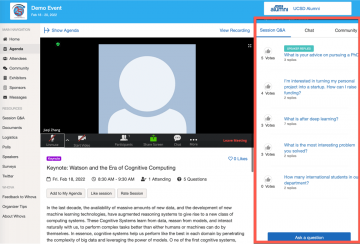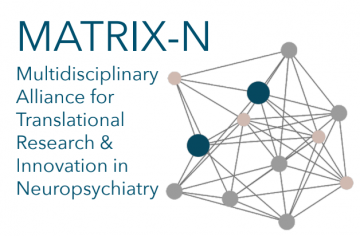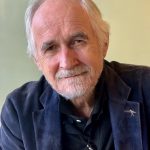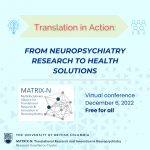Introducing an innovative virtual event focusing on translating brain research into action!
The MATRIX-N Research Cluster is excited to announce a full-day virtual event on December 6, 2022 to engage in relevant topics related to translational research, mental health solutions and novel treatments. This event will bring together hundreds of people from around the world to build capacity & share patterns of success.
Click here to register
Registration will remain open throughout the day of the conference
View the conference program
This event will focus on the translation of relevant neuropsychiatry research to novel solutions to address the ongoing overdose crisis, various mental health challenges, and pain. Topics like progress in psychedelic research, success stories in translational research and novel treatments for substance use disorders will be discussed during this full-day event
This event will welcome hundreds of people globally in a free and virtual program. Sessions will include renowned keynote speakers, engaging workshops and Lightning Talks covering relevant and emerging topics.
This event is open to all and we encourage anyone with unique perspectives and lived experiences to attend.
Meet our Keynote Speakers:

Block 1: Translational Research in Neuropsychiatry: Patterns in Success
Dr. Trevor Robbins is a Professor of Cognitive Neuroscience at the University of Cambridge, having been Professor of Expt. Psychology and Head of the Dept. of Psychology. He is a Fellow of the British Psychological Society, the British Pharmacological Society, the Academy of Medical Sciences, and the Royal Society. His contributions have been recognized through numerous prizes, including sharing the ‘Brain Prize’ of the Grete Lundbeck European Brain Research Foundation and receiving the Distinguished Scientific Contribution Award from the American Psychological Society.
 Block 2: Novel Treatment Strategies for Substance Use Disorder and Pain
Block 2: Novel Treatment Strategies for Substance Use Disorder and Pain
Dr. Andreas Heinz is a Professor of Psychiatry and Director of the Department of Psychiatry and Psychotherapy of the Charité – Universitätsmedizin Berlin, Campus Mitte, Germany. His research focuses on dopaminergic and serotonergic neurotransmission and their respective effects on reward-dependent learning, positive and negative mood states and decision making. He is a member of international clinical and scientific committees, including the German Medical Association (Deutsche Ärztekammer), the Scientific Advisory Board of the Leibnitz-Institutes for Neurobiology (IfN) Magdeburg, the Aktionsgemeinschaft Psychisch Kranke (ApK), and since 2019 he is president of the German Society of Psychiatry, Psychotherapy and Neurology (DGPPN)
 Block 3: Psychedelics: Promises and Pitfalls in Translational Research
Block 3: Psychedelics: Promises and Pitfalls in Translational Research
Dr. Gabriella Gobbi is a Professor in the Department of Psychiatry at McGill University where she holds the Canada Research Chair in Therapeutics for Mental Health. She leads a laboratory in basic neuropsychopharmacology while working as a Psychiatrist at the McGill University Health Center. Her research approach spans from bench to bedside, bridging the gaps between fundamental and clinical research. She won several prizes in the field of neuropsychopharmacology including the 2022 CINP Sumitomo/Sunovion Brain Health Basic Research Award and the CCNP Innovation in Neuropsychopharmacology.
Q: What platform is the conference taking place on?
We are using an event platform called Whova for this event. Whova helps you find zoom links for sessions you would like to attend. You can also use the platform to find the program and network with other attendees.
Q: I am having technical difficulties, where can I find help?
Many problems may occur due to limited bandwidth or unstable internet connection. We recommend restarting your router or hot-spotting your phone data if any problems persist.
If you are having trouble navigating Whova, we suggest checking out this Whova user guide: https://whova.com/pages/whova-app-user-guide/
Q: Where do I find the links to enter the conference?
Registered attendees can login here using the email address they registered with. Once you have logged in, you will have access to all the zoom links.
Q: Where do I find the Zoom links to attend workshops?
Zoom links for workshops can be found on Whova under 'Block X Workshops'. Click on the workshop you would like to attend, then click 'Join via Zoom or Whova'

Q: How do I submit questions during the keynote presentations, Lightning Talks, and Panel Discussion?
Whova has a built-in Q and A function that will be used for audience questions. Please find the question tab on the right hand of your screen once you have logged in. Please see the picture to the right for details.
Q: My question did not get answered during the conference - how can I follow-up?
You can message the speaker directly on Whova to ask follow-up questions.
Q: Do I need to register for workshops in advance?
No, you do not need to register for workshops in advance. You can simply select any workshop you would like on the day of the event.
Q: Where do I vote for my favourite Lightning Talk and E-Poster?
Voting will occur on Whova. Winners will be announced in the closing remarks.
Q: How can I promote and share this event?
We encourage participants to engage in social media and share this event among their community. Tweet us your at-home conference experience with #translationinaction so we can see the community of people joining us from across Canada and around the world to support this important cause.
There will be an award for our "Most engaged" twitter follower who will receive a "spotlight" on our social media accounts. The winner will be announce via social media in the week post-conference and will receive a certificate via e-mail.
Q: Is there an opportunity to provide feedback on this conference?
Yes, we welcome your feedback and would like to hear your thoughts on the conference. A link to a feedback form will be distributed in the week after the conference.
Q: How do I keep updated about future events?
Please subscribe to our mailing list to receive more information about future events, project updates, and more
Abstract Submission: Present your work
We encourage individuals in related fields to present their work at this event as a Lightning Talk, e-Poster or Video. We will accept abstract submissions until November 14, 2022 but will be reviewing submissions on a rolling basis. We encourage anyone interested to apply, including those from a non-academic background.
All abstract submissions will include your prefered presentation type, title and brief (<100 words) abstract for your presentation. Abstracts are welcome in any format but should include a brief description of your topic (i.e., the project, clinical trial, innovation etc). .
Submission Link: https://forms.gle/FJi5eNWTxaE8iMDR7
Lightning Talks
Lightning talk presenters will have 5 minutes to speak on a subject accompanied by slides that automatically advance every 15 seconds (20 slides total). Talks should fall under one of the following categories:
- Translating Research into Health Solutions
- New Treatment Strategies for Substance Use Disorders and Pain
Lightning Talks will be evaluated based on the following criteria:
- Covers a critical topic related to innovations in translational research, novel treatments, clinical trials or observations from practice, basic/preclinical research , community projects or related topics
- Reflects lived experiences
- Appropriate for a mixed audience comprised primarily of researchers, clinicians, students and community members
- Presents a clear position
- Communicates thought-provoking ideas
Completed slides will need to be submitted about one week prior to the conference in pptx format. We will apply the automatic 15-second transitions between slides after they have been submitted. Please find previous lightning talk presentations here to see examples of 20-slide presentations and presentations with automatic transitions.
e-Posters
Presenters will have the opportunity to share their work in a 30-minute live poster session on December 6. Each presenter will be in their own Zoom meeting where attendees can freely join their meeting and hear their presentation. This session will also allow for attendees to ask questions about their work. Each presenter will provide their own zoom link for this window. e-Posters will also be posted on our website to be viewed by attendees.
Topics can include anything relevant to the theme of translational research in neuropsychiatry, including basic and preclinical research, data from clinical trials or observations from clinical practice, community projects, innovative treatments for substance use disorders and pain, and psychedelic research. e-Posters will need to be submitted about one week prior to the conference in PDF format. Please find the previous e-Poster gallery here.
Videos
We encourage anyone who would like to showcase their creativity or is from a non-academic background to share their work or perspectives through a video. Presenters can create and share short videos (<4 minutes) on topics related to translating research into health solutions in the context of mental health, substance use disorders and pain, including sharing best practices, lived experience, results of a recent project, etc.. The purpose of these video submissions is to start conversations about experiences, innovations and perspectives on relevant topics. Videos will be posted on our Twitter and Youtube channels and some will be played during the conference. Final videos can be submitted on a rolling basis. All videos need to be submitted one week prior to the conference.
Translation in Action: Youth Competition
Are you a young person (aged 25 years or under) who wants to share your thoughts, ideas and stories about mental health and/or substance use with clinicians and decision makers? Do you want to present your work in a creative format, like visual art, poetry or dance?
All submissions will be posted on our Instagram account (@letstalkoverdose), where anyone can vote for their favourite piece. The winner will receive a cash prize! The deadline to submit is November 22, 2022.
Submit here: https://forms.gle/xz7YrTFHMdp6VKA2A
Who can submit: Anyone aged 25 and under can submit! We welcome submissions from anywhere in the world.
What to submit- You can submit in any format- whether it be a visual art piece, written story or poem, a video of you performing or anything in between. Your work will be shared on our public Instagram account (@letstalkoverdose). Topics can include your own experiences, your thoughts on what treatment for mental health and substance use can look like or sharing stories from friends and family.
Why youth- We know that youth have so many stories to share about themselves and their communities when it comes to mental health and substance use. Over 1.2 million Canadian youth struggle with mental health and less than 20% receive appropriate treatment. We hope that this can be an opportunity for youth to share their thoughts on this topic with healthcare workers, decision makers and community members in order for them to better understand the youth perspective. We also want this to be a chance for youth to express themselves and shar their creativity.
Voting- Voting will happen between November 29-December 6, 2022. All voting will take place on Instagram and will be based on the number of likes each post receives. Each submission will be posted in order of when it was submitted.
Prizes- The winner will receive a cash prize, certificate and shout-out on our social media platforms. Select participants will have the opportunity to show their work at the in-person social following the ‘Translation in Action: From Neuropsychiatry Research to Health Solutions’ conference.
What is the MATRIX-N Research Cluster?

The Multidisciplinary Alliance for Translational Research and Innovation in Neuropsychiatry (MATRIX-N) is a UBC Research Excellence Cluster that seeks to bridge gaps between research, clinical practice, and patient needs to facilitate innovative solutions to global mental health challenges.
Effective, innovative solutions to clinical mental health challenges require new strategies for developing new therapeutic options, including rapid-acting antidepressants and non-opioid alternatives to treat pain and key aspects of substance use disorders. In addition to the traditional bench-to-bedside approach, one promising development in foundational neuroscience research is the concept of ‘reverse translation’, which prioritizes insights from clinical researchers and front-line health workers in defining specific research questions with potential for immediate and significant clinical impact.
MATRIX-N is a network of emerging and internationally recognized leaders and trainees in translational neuropsychiatry research and medicine, bringing diverse perspectives and long-standing expertise. The cluster aims to create new multidisciplinary collaborations between foundational and clinical researchers at UBC and beyond. We seek to increase the translational power of neuropsychiatry research into novel pharmacotherapies and ensure more cost-effective and clinically-relevant drug development processes.
Want to learn more? Email Cluster Coordinator, Dr. Lily Aleksandrova at lilyraleksandrova@gmail.com
Meet the MATRIX-N Cluster Team:

Dr. Michael Krausz is the Providence Health Care/UBC Leading Edge Endowment Fund (LEEF) B.C. Leadership Chair in Addiction Research and a Founding Fellow of the UBC Institute of Mental Health. His research focuses on developing e-mental health tools focused on supporting people who use drugs, amongst other related topics.
 Dr. Tamara Vanderwal is an Assistant Professor at the UBC Department of Psychiatry, a BC Children's Hospital Child Psychiatrist and Head of the Naturalistic Neuroimaging Lab. She was named one of Brain Canada’s 2020 Future Leaders in Canadian Brain Research and her research uses neuroimaging to study childhood psychiatric disorders.
Dr. Tamara Vanderwal is an Assistant Professor at the UBC Department of Psychiatry, a BC Children's Hospital Child Psychiatrist and Head of the Naturalistic Neuroimaging Lab. She was named one of Brain Canada’s 2020 Future Leaders in Canadian Brain Research and her research uses neuroimaging to study childhood psychiatric disorders.

Dr. Anthony Phillips (Primary Investigator) is a Professor at the UBC Department of Psychiatry, the Former Scientific Director at the CIHR Institute of Neurosciences, Mental Health and Addiction; and the Head of Translational Medicine for Substance Use Disorders Lab. His preclinical research applies insights into normal brain-behaviour function to understanding the neural bases of mental illness and addiction.

Dr. Lily Aleksandrova (Cluster Coordinator) is a postdoctoral research fellow at the UBC Psychiatry, DM Centre for Brain Health (DMCBH). Her research investigates the neurobiological mechanisms of action of breakthrough or alternative therapies for neuropsychiatric disorders, particularly the role of neuroplasticity in the antidepressant effects of ketamine and classical psychedelics.

Marisha Boyd (Event Coordinator) completed her Bachelors of Science in Behavioural Neuroscience with a minor in Health & Society from UBC. She is interested in how neuroscience, technology and policy can intersect to improve human health. She has run many successful in-person and online events of up to 2,500 people.
Interested in collaborating or supporting this event?
We welcome contributions and partnerships of any kind, including financial support. This event is free for all and all financial contributions will go towards the cost of running our free events.
Please email acdevents@cheos.ubc.ca for information on getting involved in this event in any capacity. We look forward to hearing from you!
Please join our mailing list here to stay updated on this upcoming event and future events run by the MATRIX-N Cluster.

